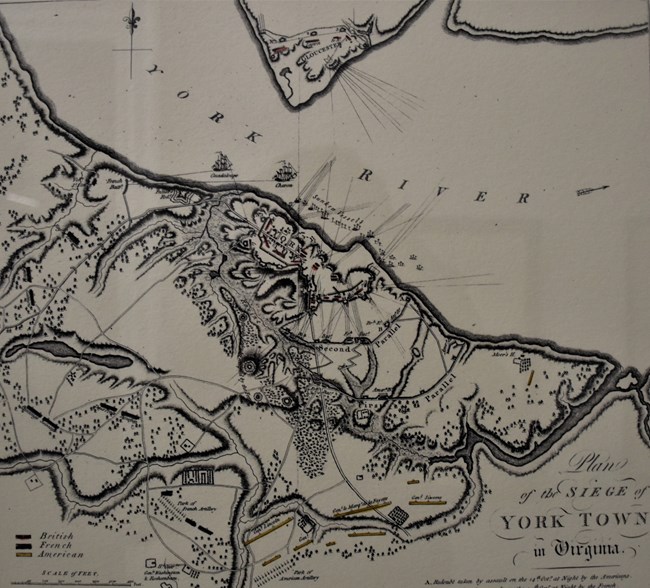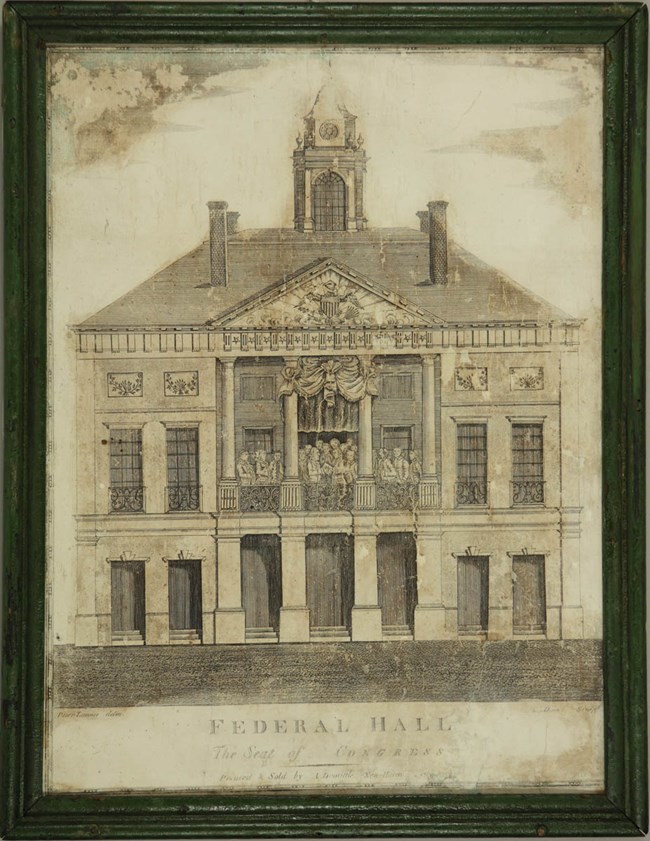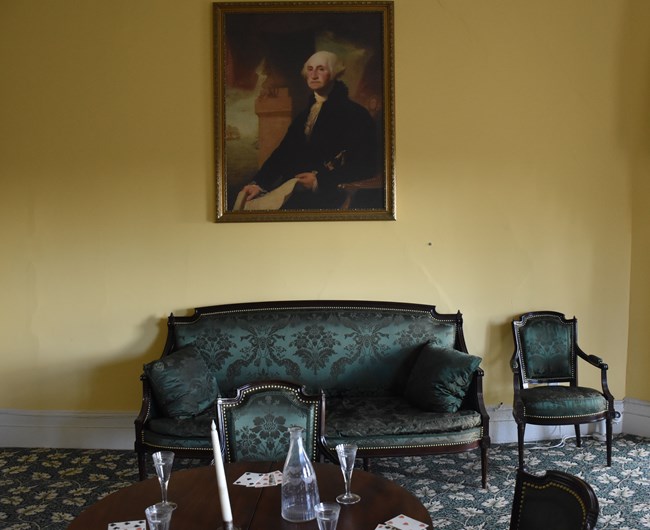Last updated: May 14, 2022
Article
Alexander Hamilton and George Washington
Hamilton Grange contains many references to George Washington throughout the home's historically furnished rooms. Alexander Hamilton and Washington contributed greatly to the establishment of the United States in the American Revolutionary War, formation of the government, and the first presidential administration.

NPS Photo.
War
The American Revolutionary War strengthned the bond between the two Founding Fathers. At the outbreak of the war, Hamilton joined a volunteer militia regiment called the Corsicans (later named the Hearts of Oak). He worked hard and showed great potential. In 1776, he was promoted to the rank of captain in the New York Provincial Artillery Company. His military prowess caught the attention of senior officers including General George Washington. In 1777, Hamilton accepted an offer to serve as Washington’s aide-de-camp with the rank of Lieutenant Colonel. Hamilton was a skilled writer, and his duties were largely administrative. While he was in Washington’s military family (a group of advisors close to Washington), they shared in the hardships of war. For example, they experienced the betrayal of Benedict Arnold and the Continental Army’s encampment at Valley Forge. Furthermore, the inefficiency of the congress in administrating the war led both to later support a strong central government.
In 1781, Hamilton and Washington had a misunderstanding that led to Hamilton’s resignation as aide-de-camp. In sum, Washington went to see Hamilton in person, but Hamilton unintentionally left Washington waiting for several minutes. Washington (who was known by some for having a temper) let his frustration be known to Hamilton. Hamilton asserted that he did not mean to offend him and resigned his position in protest. After this brief altercation, Hamilton asked Washington for a command on the battlefield. Washington was hesitant to grant this request but allowed him his opportunity at the Siege of Yorktown.
On October 14, 1781, Hamilton led a nighttime assault against a British redoubt at Yorktown. The assault was a quick success, and the redoubts were captured. This action contributed to the success of the siege. The subsequent surrender of General Cornwallis’ Army marked the beginning of the end for the American Revolutionary War.

NPS Photo.
Government
On April 30, 1789, George Washington was inaugurated as the first President of the United States at Federal Hall in New York City. On September 11, Washington appointed Hamilton as the first Secretary of the Treasury of the United States. Hamilton was a talented administrator and had many accomplishments in office including the establishment of public credit and a national bank. In addition, he would often counsel the president on a variety of matters. Nevertheless, his counsel was sometimes criticized by people with opposing viewpoints such as Secretary of State, Thomas Jefferson. While Washington sought different perspectives from members of his cabinet, he personally favored federalist ideology. At the end of Washington’s time in office, Hamilton assisted in drafting the president’s farewell speech.

NPS Photo.
Post-Presidency
In 1795, Hamilton resigned from public office and practiced law. In the following years, however, he was a part of a public scandal. In 1797, Hamilton wrote the Reynolds Pamphlet and publicly admitted to an extramarital affair with a woman named Maria Reynolds. At the time, Hamilton was suspected of misconduct as Secretary of the Treasury. In proving his innocence, he chose to publicly reveal that he was being blackmailed by an ex-lover and her husband. In this moment of vulnerability, Washington gave Hamilton a wine cooler as a token of his “sincere regard and friendship” (Washington to Hamilton, 21 August 1797, National Archives).
NPS Photo.
Quasi-War and Washington's Death
The Quasi-War (1798-1800) was a conflict between the United States and France that took place during John Adams’ presidential administration. In part, tensions rose due to French hostility toward U.S. ships. This aggression even included the capture of American vessels. Adams asked Washington to prepare and lead an army in case of war, but Washington was retired and hesitant to leave Mount Vernon. Instead, Washington supported making Hamilton Inspector General of the United States Army. Adams did not like Hamilton, but reluctantly agreed and gave him authority to prepare for war. Fortunately, Adams was able to avoid war through diplomatic initiatives.
On December 14, 1799, Washington died at Mount Vernon. Hamilton wrote Washington’s secretary, Tobias Lear, and said: “I have been much indebted to the kindness of the General, and he was an Aegis very essential to me” (Alexander Hamilton to Tobias Lear, 2 January 1800, National Archives). Aegis is a Greek word for shield. In this statement, Hamilton acknowledged that Washington was important to his career. While Washington never got the opprtunity to visit The Grange, his impact on Hamilton's life is still apparent in the home. Today, visitors may explore the home, its collections, and learn more about the relationship between Washington and Hamilton.
